Diving in
Interns deepen knowledge through experience
Biology major Linnea Mayfield ’17 found herself on a whaling boat in Boston engaged in marine mammal education and research; political science and women’s and gender studies double major Janaira Ramirez ’18 was in the thick of it in Philadelphia at the Democratic National Convention, helping to mobilize Latino voters; and strategic geography major Abraham “Abe” Ziner ’17 took on major responsibilities in Washington, D.C., as an intern at a consulting firm, including delivering a briefing on current trends in the Middle East to colleagues, a former secretary of defense, and a handful of U.S. ambassadors and generals. Summer 2016 was a busy one for Wheaton students who stepped out of comfort zones and immersed themselves in learning opportunities that will enhance their educational experience at Wheaton and prepare them for careers in their fields of interest. Here are just a few. Read more at wheatoncollege.edu/news/exploring-opportunity.
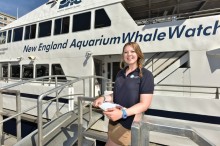 Linnea Mayfield ’17
Linnea Mayfield ’17
Major: Women’s and gender studies
Internship: New England Aquarium, Boston
Environmental research: “As an education and research intern at the New England Aquarium, I educated passengers on the ecology of the area, and assisted in the recording of data about the wildlife we encountered almost daily. The research consisted of recording behaviors, species, particular individuals encountered (specifically, humpback whales and fin whales), associations of these individuals with one another and other species, and weather data.”
Seaworthy: “I spent the fall semester of my junior year studying marine biology in Christchurch, New Zealand. These courses involved hands-on experiences in the lab and in the field, such as a collaborative abalone re-tagging project and the study of marine mammal physiology, as well as a field trip that took me on my first-ever whale watch. After this experience, my interest in marine biology concentrated on the study of cetaceans. I found out that New England Aquarium was offering a new internship on their whale-watch vessels, which encapsulated both my interest in researching whales and my desire to increase bio-literacy in the public. It seemed perfect.”
Preparing to embark: “I took ‘Biology of Whales’ through the marine studies consortium, which includes Wheaton. This course gave me an immense advantage when I began my internship, as I was well-versed in whale physiology, behavior and foraging ecology. Also, my experience as a resident advisor at Wheaton helped me develop skills in public speaking and interpersonal communication.”
Navigating skills: “Through this internship, I acquired valuable skills—from public speaking to working in the field. The most valuable aspect of the work was data collection and analysis, and working in ever-changing field conditions. One favorite moment was when I successfully identified a whale in the field. It is rewarding to know that I am beginning to recognize individuals among 800 whales that populate the area.”
Collecting data: “My biggest challenge was learning the ropes of data collection. Every trip is different, and whale activity can vary in intensity and speed. My earliest trips were chaotic, and my unfamiliarity with protocol made them slightly overwhelming. It was a steep learning curve, but with the help from the naturalists and my fellow interns, I was able to pick up tips and tricks to make the work easier.”
Charting new territory: “This internship helped me focus my interest within the wider field of biology. My field experience and the expansion of my knowledge of local ecology of Stellwagen Bank, Massachusetts Bay, and the wider Gulf of Maine area will help me in my final year of study and has given context to my past studies.”
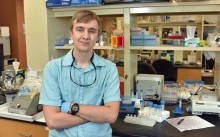 Christopher Lafen ’17
Christopher Lafen ’17
Major: Biology
Internship: Brown University Department of Molecular Biology, Providence, R.I.
Award: Balfour Scholar
Creating opportunity: “I wanted to work in a research lab, so I emailed some biology professors at Brown University. Fortunately, I got a response from researchers from the Jogl lab, who are doing very interesting work on crystallizing ribosomes.”
Researching antibiotic resistance: “The purpose of crystallizing ribosomes is so we can study how bacterial ribosomes mutate to become resistant to antibiotics. The X-ray crystallization we perform allows us to see the shape and orientation of the ribosomes after their bacteria have been grown in antibiotics. In my position, I helped grow the bacterial cells to harvest ribosomes, and then extracted and purified the ribosomes. I also worked to prepare crystallization trays of ribosomes, after which I flash-froze the ribosome crystals so they could be screened with an X-ray diffraction machine.”
Building confidence: “My internship has helped me feel more confident in working with various pieces of laboratory equipment. One of my favorite moments was when my supervisor asked me to investigate the use of microbatch crystallization as a viable technique in our lab, and I successfully produced dozens of crystals with the technique.”
Putting courses to work: “Wheaton courses ‘Cell Biology’ and ‘Organic Chemistry’ introduced me to techniques and concepts that came up during my internship. I first brought crystals out of solution in ‘Organic Chemistry.’ In ‘Cell Biology,’ I learned about ribosomes and their component parts.”
Staying in awe of biology: “I’m majoring in biology because I’ve always been interested in the study of life itself, along with how we function on the microscopic level. Even as I continue learning more about biology, I continue to discover aspects about life and the human body that amaze me.”
Preparing for a career in research: “I would like to work in a biology research environment of some sort, either in a private research lab or with a college or university. This internship gave me a very good idea of what it’s like to work in a research lab within a university.”
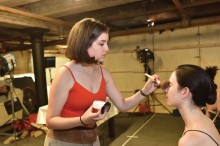 Eleanor Levine ’18
Eleanor Levine ’18
Major: Film and new media studies
Internship: Auspicious Phoenix Productions LLC, Somerville, Mass.
Funding source: Wheaton Fellowship Program
Early decision: “From the age of nine I’ve been making my own movies with my older cousins, friends and anyone else I could get to act for me. It’s something that I’ve always loved and always known I wanted to do, so that’s why I chose the major.”
Playing many roles: “As an intern at Auspicious Phoenix Productions, I had a number of different duties, which made for a very interesting and engaging summer. My jobs included working as a production assistant, taking script notes on set, syncing footage, creating sound designs for projects and even starting my own project. I also managed emails daily and, for casting calls, kept the space neat, built sets and helped run auditions.”
A quick study: “I was constantly learning on the job, especially on set, which was definitely challenging but crucial. When you need to know how to do something with only a minute to spare before the camera rolls, you will know, because you’ll have to. It’s the best way to remember things like equipment names and strategies for setting up.”
The wow factor: “I’m learning that I can do all the things I hoped I could do for so long. I kept stepping back from the scene and saying to myself, ‘Wow, I’m actually here working on a movie!’ It was the coolest feeling. It just reassured me that I’m doing what I’m supposed to do in life.”
More than movies: “At a certain point I realized that I was not only learning tons about filmmaking and actually doing real work, but I was also making friends and learning to work within a large group of people who all have the same vision. On the last day of shooting, I hugged everyone goodbye, and it was actually kind of sad because you don’t realize how close you get with these people (some of whom you won’t see again), working long days and nights to accomplish something great.”
Camera-ready: “Wheaton prepared me for a lot of what this internship entailed. Courses like ‘Digital Editing’ and ‘Production I’ were extremely important. Before I came to Wheaton, I knew nothing about cameras, let alone about how to write a plot.”
A multifaceted story: “I know I want to work in film or TV, but right now I’m interested in many different aspects: editing, cinematography and even comedy writing. So, this internship—through which I learned all different components of moviemaking—will be really crucial to my career later in life.”
(Read about Levine’s documentary being accepted into a film festival)
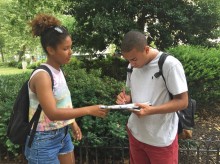 Janaira Ramirez ’18
Janaira Ramirez ’18
Majors: Political science and women’s and gender studies
Internship: Civic engagement intern with the Pennsylvania Democratic Party, helping to mobilize voters for the upcoming presidential and local elections
Funding source: Wheaton Fellowship Program
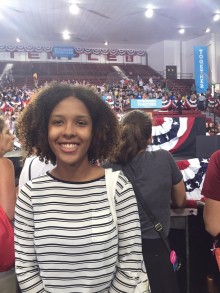 Registering voters: “I registered voters and helped recruit volunteers for phone banks of voter registration drives. I also helped organize events like Hillary Clinton’s rally at Temple University. During the first three days of the Democratic National Convention, I was at one of the Philadelphia Democrats’ offices helping organize the first stop of Hillary Clinton’s and Tim Kaine’s battle-ground-state tour. On the last day of the convention, I was able to attend the convention and watch Clinton accept her nomination. It was absolutely amazing! I cannot describe what it felt like to be able to witness history in the making.”
Registering voters: “I registered voters and helped recruit volunteers for phone banks of voter registration drives. I also helped organize events like Hillary Clinton’s rally at Temple University. During the first three days of the Democratic National Convention, I was at one of the Philadelphia Democrats’ offices helping organize the first stop of Hillary Clinton’s and Tim Kaine’s battle-ground-state tour. On the last day of the convention, I was able to attend the convention and watch Clinton accept her nomination. It was absolutely amazing! I cannot describe what it felt like to be able to witness history in the making.”
Reading the public: “The ability to be able to relate and connect to people has been by far the most useful thing during my internship and in working on this campaign. I learned a lot about people. I was able to have a firsthand account of the political dissatisfaction of the American public. A lot of the people I spoke to on the streets did not feel like their vote mattered or did not want to vote because they’ve been let down by candidates with false promises too many times.”
Relying on coursework: “The research and analysis of the changes in African American voter turnout that I did for my final paper for my poli-sci research methods course helped a lot when registering voters. Philadelphia has a large African American population, so I was able to use what I learned to work different angles when trying to convince voters to register and make sure they vote in November.”
Making major decisions: “When I was in high school, I always talked about becoming the mayor of New York at some point, and I always enjoyed politics, so majoring in political science was a pretty simple choice. I chose women’s and gender studies to be my second major because I took the intro class with Denise Davis and I absolutely loved it. The women’s and gender studies courses I’ve taken so far have allowed me to learn so much about myself, and what I stand for. I am a woman who will eventually get into politics, and both of these majors complement each other well.”
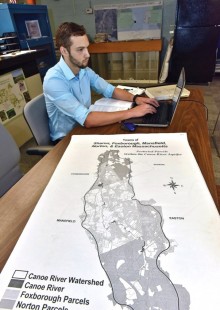 Michael Schmidt ’17
Michael Schmidt ’17
Majors: Biology and German
Internship: Norton Conservation Committee, Norton, Mass.
Award: Trustee Scholar
First draft: “For my internship at the Norton Conservation Committee, I worked on drafting a resource management plan for Canoe River Aquifer, a resource of environmentally critical concern that encompasses Norton, Easton, Mansfield, Foxboro and Sharon. It’s where we derive all of our water. If the water were contaminated, 50,000 people would be without a drinking water supply.”
Collaboration: “I worked under the Canoe River Aquifer Advisory Committee. My supervisor, Norton conservation agent Jennifer Carlino, is part of the committee. I attended its meetings, with about 20 people, including biologists and land preservationists.”
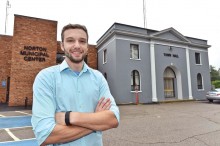 A man and a plan: “I was the only one drafting the plan. My boss gave me the information to work with, and encouraged me to talk to the water department in each town to gather more data. It’s a very large-scale project. The biggest challenge was that the data available are out of date. The advisory committee formed in 1983, and they stopped collecting data before 2000. The resource management plan ultimately describes what data we have, what data we need, and recommendations on how to move forward.”
A man and a plan: “I was the only one drafting the plan. My boss gave me the information to work with, and encouraged me to talk to the water department in each town to gather more data. It’s a very large-scale project. The biggest challenge was that the data available are out of date. The advisory committee formed in 1983, and they stopped collecting data before 2000. The resource management plan ultimately describes what data we have, what data we need, and recommendations on how to move forward.”
Town connections: “I found out about the position through word of mouth. I’m friends with a couple of Norton firemen with whom I play on a softball league. I told them I had an opportunity for an unpaid internship in ecological biology, and they talked to the conservation board. That is how I found out about the opportunity.”
In the field: “My favorite part about the internship was going into the field to explore the Canoe River; we had been out there working to make a culvert more eco-friendly. It was awesome. It is one of the most pristine areas we have left, where you see nature as it should be.”
First time’s the charm: “This is the first internship I’ve ever done. It’s awesome to know the work is meaningful, but it was daunting, as I didn’t want to mess anything up. Once the plan is finally drafted, it will go to the Department of Environmental Protection for state approval.”
 Rebecca Smith ’17
Rebecca Smith ’17
Major: Neuroscience
Internship: Human resources intern at the New England Aquarium, Boston
Funding source: Wheaton Fellowship Program
An important mission: “I am very interested in recruitment, managing employee relations and ensuring equal opportunities for all employees. I visited the New England Aquarium quite often as a child. I was excited to discover the human resources internship role there because I truly believe the aquarium is a catalyst for global change and educating a wide range of individuals on conservation, research and the importance of ocean biodiversity.”
Varied responsibilities: “My internship included assisting with recruitment by posting jobs and observing interviews. I audited benefit packages and created employee benefit folders, maintained files and completed data entry within the aquarium’s HR database. I also conducted job description inventory for all positions.”
Diving in: “My biggest challenge was constantly learning new things. Coming from a neuroscience background with no formal education in business or nonprofit administration, I found it challenging and fun learning about human resources. My internship relates to my neuroscience major because of the connections and complex problems I had to solve daily. In HR, an individual may be tasked with recruitment, solving a benefits and compensation issue, or ensuring employees are meeting performance regulations. These sectors do not always flow together, and that reminds me of the connections I make as a neuroscience major between psychology, biology and chemistry.”
Some fun, too: “My favorite moment on the job was visiting the aquarium with my mentor. I was working really hard to meet a deadline for a specific project, and after I handed it in she asked if I wanted to see the new octopus exhibit with her. It was a great opportunity to bond with my supervisor and discuss her position at the aquarium further.”
Transferable skills: “My position as a resident advisor (RA) helped me have a successful internship. As an RA you are asked to have strong interpersonal skills, create a community on your floor and educate your residents on important issues. In HR, I regularly used those skills.”
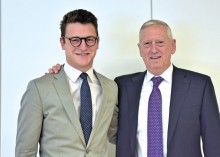 Abraham “Abe” Ziner ’17
Abraham “Abe” Ziner ’17
Major: Strategic geography (independent major)
Internship: The Cohen Group
A rare opportunity: “I interned at The Cohen Group in Washington, D.C., which is a source of global strategic insight on a wide variety of fields, from defense and security to health care and infrastructure. I was intrigued by both the dynamic nature of the work undertaken by The Cohen Group, as well as the opportunity to work alongside and learn from the very people whose work I have studied in my classes at Wheaton.”
Forging a path: “I am pursuing an independent major in strategic geography. The major is my attempt to understand both the parts of society and theory that underpin and interconnect today’s Middle East. Early on at Wheaton, I realized that specializing in a particular subject, even in the context of a liberal arts college, wasn’t going to give me the breadth of understanding I wanted. Writing my own major provided an excellent way to gain the diversity of academic experience I craved while at the same time allowing me to focus on the fascinating connections between disciplines. While I initially drew up the plan for the major my sophomore year, it was during my time studying in Egypt that I realized the necessity of studying the variety of subjects my major allowed for.”
Dynamic duties: “Assignments ran the gamut from researching an emerging foreign market and assessing a business development strategy to drafting correspondence to heads of state, and delivering briefings to a room full of former generals and ambassadors. Some days I worked as part of a larger research team doing an in-depth analysis of a business or security environment, whereas others I had an hour or two to prepare a briefing for one of the ambassadors before they spoke to a client, media or other official.”
Changing pace: “There is an entirely distinct approach to research in this environment. Changing from an academic mindset to this much faster pace was disconcerting at first, but it has taught me how to research in an entirely different, and I’d say more effective, way. I’ve learned how to put together material that I can deliver and be entirely confident in, as well as learned how to say that I can’t take on certain tasks, that I’m swamped, or that I couldn’t find an answer. I’ve learned how to work right up to the edge of my capabilities and how to draw on the knowledge of others around me to fill out what I can’t answer on my own.”
Part of the team: “I have been amazed at just how integrated I’ve felt as an intern. During the first week, I was on a research team working on a very tight deadline. After we had worked for many hours, and mounds of papers seemed to have grown out of the tables, the team lead looked to me and asked for my thoughts on our methodology and conclusions. I was astonished by the agency they gave me. I was able to see my input alter and affect the work of the entire team as it moved and influenced our final conclusion. This happened repeatedly, and was one of the most significant and rewarding parts of the experience.”
Answering to oneself: “I learned that it’s very rare that you will have the answer to a question from something that you have read or studied. Rather, you are faced with new questions and have to stitch together an answer utilizing every last fact, experience, conversation and slice of knowledge you have gained. I thank Associate Professor of Political Science Alireza Shomali for pushing me to always be more creative and inventive in how I approach and understand the questions I come across.”
Looking forward: “After graduation, I hope to go back to the Middle East in a research capacity. This coming year, I hope to draw on the tools my major has given me, the lessons I learned while I was abroad and the experience I’ve gained through this time in Washington, D.C., as I pursue a senior honors thesis exploring the ways political structures shift as communities transform from rural to urban environments.”
Read about these students online at wheatoncollege.edu/news/exploring-opportunity
- Emily Bodell ’17
Major: Biology
Internship: Napatree Point Conservation Area, Watch Hill, R.I. - Amalia Quesada Nylen ’17
Majors: English and Hispanic studies
Internship: Social Innovation Forum, Boston - Ian Opaluch ’17
Major: Economics
Internship: Wheaton Innovates at MassChallenge, Boston - Sahilia Ramirez ’18
Major: Women’s and gender studies
Internship: Research assistant, Wheaton History Department - Asher Trout ’18
Majors: Anthropology and film and new media studies
Internship: Storytank Media, Portland, Ore. - Katharine Wilkinson ’17
Major: Sociology
Internship: Newsroom intern, WPRI-TV, Providence, R.I. - Hannah Zack ’18
Majors: Psychology and sociology
Internship: Research assistant at Wheaton